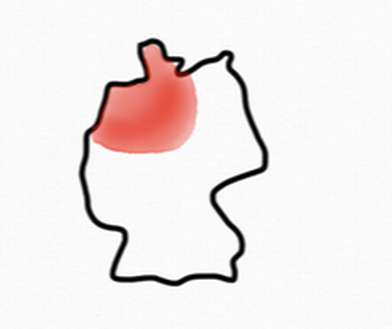All you need
to know about
Korn
in a nutshell
Korn is a German or Austrian grain based distilled beverage.
What does Korn with a K mean?
It is also known as Kornbrand or Kornbranntwein (in English it is “grain brandy” or “grain spirit” and obvioulsy nothing to do with the English “Corn” or any heavy metal band neither).
In the production of Korn only the cereal grain such as rye, wheat, barley, oat and buckwheat are allowed. Most of the production is based on rye or wheat; barley and buckwheat are rarely used. Barley is mainly used to obtain the required malt for the brewing process.
Korn is distilled to a low abv and little filtered, which leaves more of the cereal grain flavor in the finished spirit.
To be named Korn, a Korn must contain at least a minimum of 32% abv.
Above 37.5% ABV it is named Kornbrand.
Korn and Kornbrand can be used in the German spaking countries as soon as the distillat is produced from whole grain of wheat, rye, oat, buckwheat and barley.
Above 38% ABV it is named Doppelkorn.
In some other regions of Germany, you can find “Apfelkorn“. After the war it has been fashionable to develop such drinks. there are a bit forgotten now, but you may find some still bearing the name Korn. Even if they shouldn’t.
In Germany you can also find some Korn named Klarer. All Korn are Klarer but not all Klarer are Korn. Klarer are for any grain distillate not respecting the law of 1909 followed by the European directive of 1989/90.
The geography of Korn
The home of Korn is the north west of Germany. This is also since a 1990 European directive the only place when a grain distillate can be named Korn. This is gonna change though, as Korn is also made in Austria.

The History of Korn
Korn is a typical German distillate which was first regulated in the autonomous city of Nordhausen in the 1500s.
This is indeed in this city that the first ban on Korn production is recorded in writing, in 1545. A decree of the city council prohibited the use of grain or malt for the production of spirits. Historians believe beer brewers wanted to defend themselves against the competition of Kornbrand producers, which had increased the cost of grain.
The first “purity law”* for the distillation of Korn was established in 1789. The regulation set by the city of Nordhausen stipulated that two thirds rye and one third barley or malt shall be used.
In 1909 the law was updated and it was added that only whole grain wheat, rye, barley, buckwheat or oat cultivated on soil in German speaking countries is used. Additional flavourings, aromas and coloring agents are hereby forbidden. Flour, corn and residues or scraps from mills etc. are not permitted in the production process.
Likewise, mixing the Korn with other types of alcohols or additives is prohibited.
The distillation of Korn was the subject of many bans along the centuries till 1954, where distillation was again authorized.
Because of those many interruptions of productions, the science of distillating Korn often disappeared or wasn’t transmitted to the next generation. This explain, among other reasons due to the context of the reconstruction of Germany, why bigger corporations took over the productions, and that the quality dropped.
For a long time there have been thousand of producers, but along with the industrialisation of the agriculture in Germany, it became a mass product, often synonym of lower quality and low cost liquor.
Yes this is often the spirit you find quite at the bottom of the shelves of German supermarkets.
Since the beginning of the 21th century, thanks to a new generation of distillers who looked at this spirit again, there are decent alternatives today.
Purity Law ?
This is something to know if you are interested in spirits made in Germany. What is a purity law, or in German “Reinheitsgebot”, sometimes translated as “Beer Purity Decree”, specifies the ingredients permitted in the brewing of beer in Germany. Dating from 1516, it is one of the oldest European food decrees.
How is Korn made?
Korn is made with a limited list of grains:
- Rye
- Wheat
- Oat
- Barley (used for starting the mash)
- Buckwheat
The cereal which is malted (often barley) must not reach more than 25%.
The Fermentation of Korn
Did you follow the class about vodka? Conversion and fermentation process are very much alike.
In the beginning there is the grain, often the barley (helps for the mash), which is processed to malt. This stimulates a natural process that turns the starch in the grain into sugar.
The Distillation of Korn
Korn is made with all kind of pot, but for genuine Korn producers, pot stills are the only distillation tools that will respect the quality of the grain.
Korn is very little filtered, compared to vodka. Why ? Because Korn is not a neutral spirit, the idea is to offer a pronounced taste of the base material. Like other spirits, Korn is reduced to reach 32 or 38% abv
Nothing is added to Korn, the law is quite strict.
The Maturation and Ageing of Korn
No maturation period is required for Korn. Some Korn are actually matured in cask.
The aged Korn have been quite rare for a while, but many experiences have been done by young producers, and this is becoming a new category to watch.
RESOURCES/SOURCES
The Drunken Botanist, Amy Stewart
Alcools, André Dominé
Of course Wikipedia, but do not forget great websites of passionate producers such as Sasse.
For the definition : Lichine, Alexis (1987). Alexis Lichine’s New Encyclopedia of Wines & Spirits (5th ed.). New York: Alfred A. Knopf. p. 292 and Wikipedia as on February 21st, 2018.

